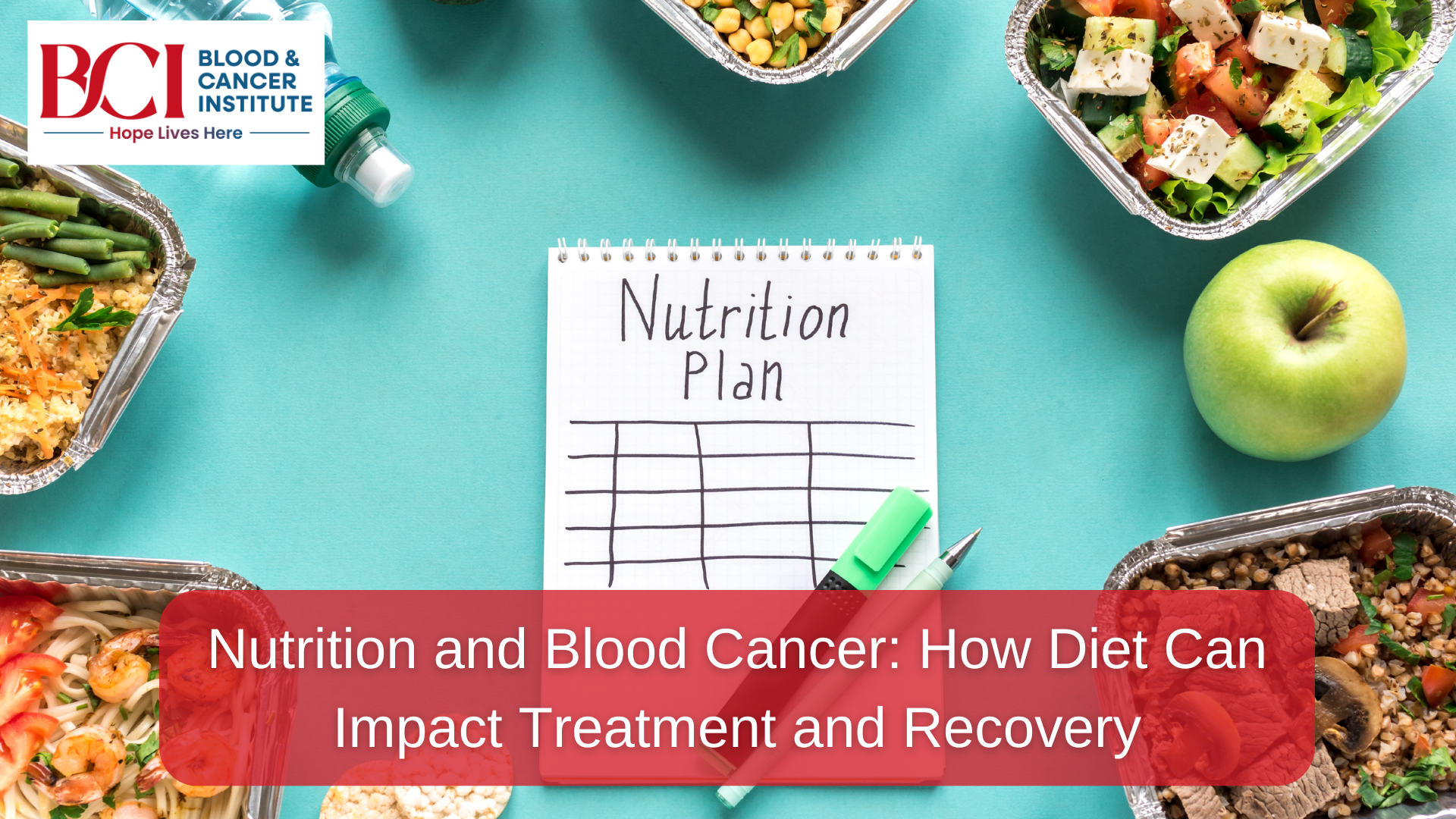
- By : BCI
- Blog
- Comments: 0
Nutrition and Blood Cancer: How Diet Can Impact Treatment and Recovery
Blood cancers, including leukaemia, lymphoma, and myeloma, pose significant health challenges due to their impact on the bone marrow, blood, and lymphatic system. While medical treatments such as chemotherapy, radiation, and stem cell transplants are fundamental in combating these diseases, our cancer specialists in Surat at BCI- Blood & Cancer Institute, emphasize on emerging research pointing to the crucial role of nutrition in treatment and recovery. A well-balanced diet can help manage symptoms, boost immunity, enhance the efficacy of treatments, and improve overall quality of life for blood cancer patients.
The Role of Nutrition in Blood Cancer Treatment
According to our blood cancer specialists in Surat, at BCI- Blood & Cancer Institute, food and nutrition play a vital role in treatment and recovery of blood cancer, including:
1. Supporting the Immune System:
Blood cancers often compromise the immune system, making patients more susceptible to infections. Nutrition plays a vital role in bolstering immune defences. Diets rich in vitamins and minerals, particularly vitamins A, C, D, E, and zinc, are essential for maintaining a robust immune response. Foods such as citrus fruits, berries, leafy greens, nuts, and seeds are excellent sources of these nutrients.
2. Managing Treatment Side Effects:
Cancer treatments can lead to various side effects, including nausea, vomiting, diarrhoea, and loss of appetite. These can result in significant weight loss and malnutrition, further weakening the body. Our cancer specialist in Surat at BCI, Blood and Cancer Institute — a blood cancer hospital in Surat, recommends incorporating small, frequent meals that are nutrient-dense to help maintain energy levels. Bland, easy-to-digest foods like bananas, rice, applesauce, and toast can alleviate gastrointestinal discomfort, while ginger and peppermint can help reduce nausea.
3. Maintaining Muscle Mass and Energy Levels:
Muscle wasting and fatigue are common in blood cancer patients. A diet high in protein is critical to counteract these effects. Lean meats, fish, eggs, dairy products, legumes, and nuts provide the necessary building blocks for muscle repair and maintenance. Additionally, whole grains and complex carbohydrates like oats, quinoa, and sweet potatoes can supply sustained energy, helping patients cope with the patient’s physical demands seeking blood cancer treatment in Surat.
4. Hydration:
Adequate hydration is vital, particularly for patients undergoing chemotherapy. Hydration helps in flushing out toxins, managing side effects like dry mouth and constipation, and maintaining overall cellular function, says our blood cancer specialist in Surat. Water, herbal teas, and clear broths are good options. Including water-rich fruits and vegetables such as cucumbers, melons, and oranges can also contribute to hydration.
Nutritional Strategies for Recovery
Hemato-oncologists in Surat, consulting at BCI — Blood and Cancer Institute, suggest adopting the following strategies:
1. Antioxidant-Rich Foods:
Antioxidants are compounds that protect cells from damage caused by free radicals, which are often elevated in cancer patients. Foods high in antioxidants, such as berries, dark chocolate, nuts, and green tea, can help repair and protect the body’s cells during recovery.
2. Anti-Inflammatory Diet:
Chronic inflammation can exacerbate cancer progression and impede recovery. An anti-inflammatory diet that includes omega-3 fatty acids, found in fatty fish like salmon and flaxseeds, can help reduce inflammation. Additionally, spices such as turmeric and ginger have potent anti-inflammatory properties and can be easily incorporated into daily meals.
3. Gut Health:
The gut microbiome plays a crucial role in overall health, influencing the immune system and inflammation. Probiotic-rich foods like yogurt, kefir, sauerkraut, and kimchi can support a healthy gut flora. Prebiotics, found in foods such as garlic, onions, bananas, and asparagus, feed beneficial gut bacteria, promoting a balanced microbiome.
4. Personalized Nutrition Plans:
Given the diverse needs and responses of cancer patients, personalized nutrition plans developed with a registered dietitian or nutritionist can be particularly effective. These plans can address specific deficiencies, manage side effects, and accommodate individual preferences and tolerances, ensuring that patients receive optimal nutritional support throughout their treatment and recovery journey.
Practical Tips for Blood Cancer Patients
Patients undergoing leukaemia treatment in Surat must follow these tips for quick recovery:
1. Small, Frequent Meals:
Eating small, frequent meals rather than three large ones can help manage appetite loss and prevent feelings of nausea. Each meal should aim to be balanced, incorporating a source of protein, healthy fats, and carbohydrates.
2. Smoothies and Soups:
For those struggling with solid foods, smoothies and soups are excellent alternatives. They can be nutrient-dense and easier to consume, especially when enriched with protein powders, greens, and healthy fats like avocado or nut butters.
3. Food Safety:
Patients undergoing treatment for blood cancer have a heightened risk of infections due to immunosuppression. It is crucial to practice food safety, including thorough washing of fruits and vegetables, proper cooking of meats, and avoiding raw or undercooked foods.
4. Supplements:
While it is best to obtain nutrients from whole foods, supplements can sometimes be necessary, particularly in cases of severe deficiency or during periods of intense treatment. Any supplementation should be guided by a healthcare professional to avoid potential interactions with cancer therapies.
Conclusion
The relationship between nutrition and blood cancer is complex and multifaceted. A thoughtful, well-planned diet can significantly enhance the efficacy of medical treatments, mitigate side effects, and promote recovery and well-being. By focusing on nutrient-rich foods, managing inflammation, supporting gut health, and personalizing nutrition plans, blood cancer patients can empower themselves to navigate their treatment and recovery with greater resilience and vitality. As always, consulting with healthcare providers and dietitians is essential to tailor dietary strategies to individual needs and circumstances.
